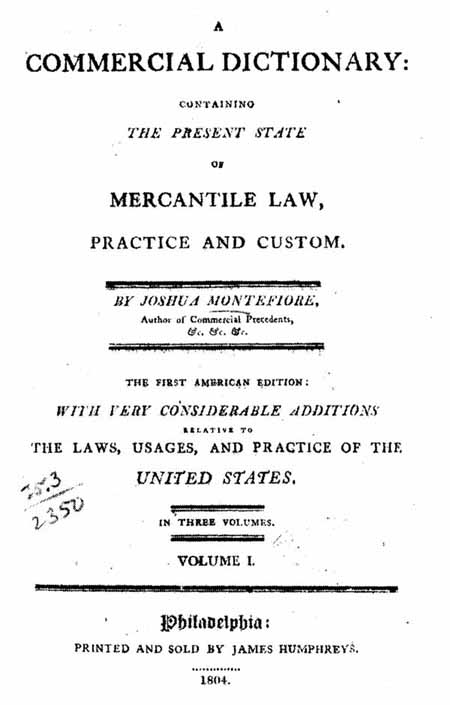First Judaica & Judaic Firsts: Montefiore's Dictionary
Jefferson would have admired the adventurous spirit (and been bemused by the selective memory and autobiographical audacity) of the author of the three-volume A Commercial Dictionary . . .First American Edition. . . , Philadelphia, 1804, Joshua Montefiore (London, 1762-St. Albans, Vermont, 1843). As a youth, Joshua had turned from the Montefiore business pursuits in Italy and England to begin a life of adventure on three continents: Europe, Africa, and America. Between adventures he produced a small corpus of useful commercial handbooks of which the Dictionary was the most notable. For the American edition he received subscriptions ranging from Halifax, Nova Scotia, to Savannah, Georgia. Since the author himself personally solicited the subscriptions, he must have done considerable traveling on the American continent as he did on others. Though his assertions are often exaggerated, they are rooted in truth. His claim to have been the first Jewish undergraduate to study at Oxford is unsupported by university records and challenged by the fact that Oxford in the eighteenth century did not officially admit Jewish undergraduates. But he apparently did receive a good education and was a fine English stylist. He also claimed to have been the first Jew to receive a commission in the British army. Though no army list contains his name, his nephew, Sir Moses Montefiore, remembered Uncle Josh with his "laced red coat and pigtail, and cocked hat and sword."
 |
In 1784 Joshua Montefiore was admitted to practice as a solicitor in London and a year later was appointed Notary Public. But in 1787, when he applied to be admitted to the bar in Jamaica, he was turned down because a 1711 law excluded "Jew, Mulatto, Indian or Negro." Five years later, he was one of the leaders of some three hundred colonists who settled the island of Bulama off the west coast of Africa, endeavoring to prove that tropical colonies could be cultivated successfully without slave labor. The noble experiment failed, but Montefiore subsequently published an interesting account of his adventure. He found a home in America at last, arriving possibly as early as 1803 to prepare the American edition of his Dictionary. He was certainly living in Philadelphia when he published the popular The American Traders Compendium in 1811. In 1835, at age seventy-three, he married his deceased wife's maid and moved to St. Albans, Vermont, where he farmed and relied upon the generosity of his nephew, Sir Moses, to support his growing family, which in the eight years before his death in 1843 increased by eight. Though he had little to do with Jewish life in his last years, family tradition has it that he remained an observant Jew and had his sons circumcised, though he permitted his children to be brought up as Christians. He was buried on the family farm so that he would not spend eternity in the town's Christian burial ground. Before death he prepared from memory a translation of the Jewish burial service to be read at his interment and in the family Bible he wrote out a Prayer, thoroughly Jewish in its content and language, to be recited by his children each night. It begins:
We have sinned, 0 our father, pardon us 0 our Creator, Hear 0 People the Lord our God is One ...
and concludes
We further humbly pray and beseech you 0 God, to protect us, grant us health, honesty, virtue, and industry, and that we may keep and observe the Holy commandments, amen.
The life of Joshua Montefiore tells us much about Jewish life in the Old World and in the New in that fateful century, 1750-1850, when the Jews were beginning to enter the larger society-physical and spiritual uprooting and wandering, discrimination, accommodation, and assimilation.
Sources: Abraham J. Karp, From the Ends of the Earth: Judaic Treasures of the Library of Congress, (DC: Library of Congress, 1991).


